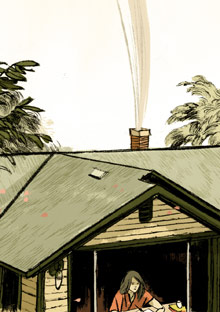The Writers' House: Turning a Cottage into a Creative Retreat

Illustration: Jillian Tamaki
Faced with the loss of her neighbor, novelist Alice Hoffman decides to honor his memory by turning his neglected cottage into an imagination-nourishing haven.
One brilliant June day, my husband and I arrived at our summer house on Cape Cod to discover that our elderly next-door neighbor had passed on during the long, cold winter. He was a quiet, solitary fisherman with whom we shared a dirt road. The two properties smacked up against each other, several acres of pine and oak on the outermost reaches of the cape, overlooking a quiet pond that our neighbor had stocked with trout. Through the years, we had been busy with children and visitors, illness and joy, all in a steady stream. Conversations with our neighbor were brief and friendly: Had anyone seen his missing cat? Did we know that wild turkeys had been roosting in the woods and liked to perch on his old car? Could our sons cut a path through his woods to drag a kayak into the pond?We hadn't imagined we would ever want our neighbor's house, a knotty pine-paneled cottage, but when it went up for sale my husband and I realized how grateful we were for so many peaceful years. As abutters, our households had been in agreement, wishing to leave our properties undeveloped, true woods, open to other neighbors who might like to hike across the land in summer or snowshoe in winter.
After thinking it over, my husband and I got in touch with our neighbor's sister, in her 80s and several states away. We bought the place on a whim, intending to knock it down. We'd let the woods take over, let the wild turkeys rule. But soon we began to look beyond the peel-and-stick vinyl tiles, the woodstove with a rusty pipe that went right through the ceiling and leaked whenever it rained, the falling-down barn that was too dangerous to enter, the old-fashioned water pump and cinder-block foundation. We gazed around at the overgrown gardens, patches of daylilies and roses, wild now but once carefully tended. Years ago someone had planted the hedge of spindly lilacs and the enormous pink mountain laurel that flowered beside the screened-in porch. The house, so dilapidated, had clearly been someone's dream.
Who were we to destroy what our neighbor had built?
In the end, we decided the little house could be our dream as well. We would make it into the perfect writers' retreat—a place where our friends could come when they needed to escape from the world, a refuge where the best medicine for writer's block would be the blooming mountain laurel, the scent of lilacs, the deep green shadows cast by old oak trees, part of the original forest Pilgrims had all but cut down.
Falling for a dilapidated house is nothing but trouble. Everything costs more than you expected. Yet there can be lovely discoveries as well: Beneath the vinyl tiles were beautiful maple planks. When we tore out the woodstove and the pipe and raised the ceiling, the cottage seemed surprisingly spacious. We took down all the exterior walls in the living room and replaced them with glass. Once we did, we discovered that we had a tree house. Because our neighbor's cottage had been built on a hill, there was an extraordinary view of the woods. We left the tree that grew up through the deck, a bower of green to sit beneath. All of a sudden the dark, mildewed space felt airy and light, open with possibilities. A house where the clouds were right outside the door.



